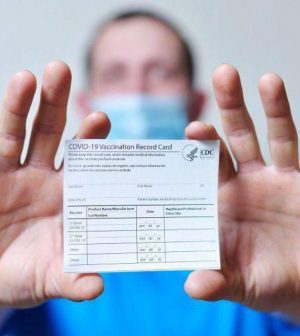- 10 Strategies to Overcome Insomnia
- Could Artificial Sweeteners Be Aging the Brain Faster?
- Techniques for Soothing Your Nervous System
- Does the Water in Your House Smell Funny? Here’s Why
- Can a Daily Dose of Apple Cider Vinegar Actually Aid Weight Loss?
- 6 Health Beverages That Can Actually Spike Your Blood Sugar
- Treatment Options for Social Anxiety Disorder
- Understanding the Connection Between Anxiety and Depression
- How Daily Prunes Can Influence Cholesterol and Inflammation
- When to Take B12 for Better Absorption and Energy
Even When Undergoing Treatment, People With MS Gain From COVID Vaccines

Multiple sclerosis (MS) patients undergoing a treatment that depletes a type of immune cell that fuels MS attacks still have a strong response to mRNA COVID-19 vaccines, a new study finds.
“The message from this study is clear — it is worthwhile for patients with MS receiving [anti-CD20] treatment to get a COVID-19 vaccine, which will prevent severe illness,” said researcher E. John Wherry, director of the Penn Institute for Immunology, in Philadelphia.
Anti-CD20 treatment depletes the B-cells that contribute to the MS attacks. B-cells and T-cells are types of white blood cells that make immune system antibodies.
For the study, Wherry’s team measured antibody and T-cell responses in 20 patients with MS who were getting anti-CD20 treatment. They compared those patients with a group of healthy people.
All of the healthy participants had antibodies following the first dose of an mRNA vaccine (such as Moderna or Pfizer), and the level of antibody increased after the second dose. In patients with MS, however, the antibody response was more varied.
A month after their second vaccine dose, between 50% and 85% had developed protective responses to SARS-CoV-2. For those without detectable antibodies, the size of the response was lower and delayed, the researchers found.
“This data not only reveal that patients undergoing anti-CD20 infusions are still able to mount important COVID-19 vaccine responses which are likely to protect from severe illness, but also informs our clinical practices in how we advise patients with MS and other autoimmune disorders on such therapies,” said researcher Dr. Amit Bar-Or, chief of the division of MS and related disorders at Penn’s Perelman School of Medicine.
“For example, knowing that responses are weakest immediately following an anti-CD20 infusion, we can now advise patients to wait a number of months after their therapy to get a COVID-19 vaccine,” Bar-Or added in a university news release.
Because of the limited antibody responses among patients receiving anti-CD20 treatment, they might not be able to kill the virus as quickly before it infects other cells, the researchers said. As a result, they could be carriers of the virus for a longer period of time.
The findings were published online Sept. 14 in the journal Nature Medicine.
More information
For answers to your questions about COVID-19 vaccines, visit the U.S. Centers for Disease Control and Prevention.
SOURCE: University of Pennsylvania Perelman School of Medicine, news release, Sept. 14, 2021
Source: HealthDay
Copyright © 2026 HealthDay. All rights reserved.










